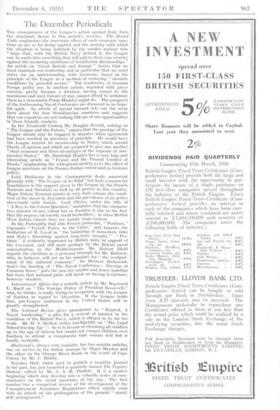The December Periodicals
Tim consequences of the League's action against Italy form the dominant theme in this month's reviews. The Round Table emphasises the uncertain effect of such economic sanc- tions as are so far being applied and the anxiety with which the situation is being watched by the smaller nations who " hope that, with the British Navy behind it, the League can be made into something that will add to their own security against the menacing ambitions of totalitarian dictatorships." An article on "Great Britain and Europe " insists that we .must maintain our leadership and in particular that we must strive for an understanding with Germany, based on the principle of the League as a method of removing " obsolete conditions by peaceful means." The tendencies of German foreign policy are, in another article, regarded with grave concern, partly because a dictator, having armed to the maximum and used threats of war, cannot afford to withdraw them as a democratic Prime Minister might do. The prospects of the forthcoming Naval Conference are discussed in no.hope- fitl spirit. An article of special interest sets out the main facts about the four Scandinavian countries and suggests that our exporters are not making full use of our opportunities in thoSe friendly marketi. . , • In the Nineteenth Century Mr. Douglas Jerrold, writing on " The League and the Future," argues that the prestige of the League should only be engaged in disputes when agreement had been reached on questions of principle. He would have the League restrict its membership to States which accord liberty of opinion and which are prepared to give one another "clear economic and fiscal advantages at the expense of non= member States.", Mr. Randolph Hughes leas a very long and interesting article on " France and the Present Conflict of Ideals," emphasising the widespread anxiety as to the effect of League sanctions on the Franco-Italian entente and on German policy. Lord Dickinson in , the Contemporary deals somewhat gloomily with" The League on its Trial" but finds a reason. for hopeftilness in the support given to the League by the French Radicals and Socialists as well by all parties in this country. Major Poison Newman paints in very dark colours the condi- tion of the slaves in Abyssinia and the prevalence of an active slave-trade with Arabia, Lord Olivier, under the title of " A Key to the Colour Question," maintains that the compara- tive absence of any colour bar in Jamaica is due to the fact that the negroes are mostly small freeholders ; in other British West Indian islands they are mainly wage-earners. the .fortnightly that able French journalist, " Pert itiax," expounds French Policy in the Crisis," and laments the hesitation of M. Laval in `, the balancing of immediate risks and Italy's friendship against long-term security." " Per- tinas. " is evidently impressed by British unity in support of the „Covenant, and still more perhaps by the British naval concentration in the Mediterranean. Mr. Robert Hield regards the elections as a personal triumph for Mr. Baldwin, who, be believes, will act on his mandate for " the readjust- Ment of the national economy." Sir Herbert Richmond, under the heading of The Naval Conference : Prestige or Common Sense," puts the ease for smaller and fewer warships but fears that national pride will insist on having leviathans, however obsolete.
International Affairs has a notable article by Mr. Raymond L. Buell on " The Foreign Policy of President Roosevelt," Who lie thinks, is really trying to co-operate with the League of *ations in regard to Abyssinia. If the League holds firm, pro-League sentiment in the United States will be greatly strengthened.
The National Review gives prominence to " Wanted, A Naval Awakening," a plea for a revival. of. interest in the condition of the British Navy, which is alleged to be far too weak, Mr. H. S. Shelton writes intelligently on " The Legal SchOol-leaving Age " : he is in favour of educating all children up to the age of sixteen but would not compel children over fourteen to attend—a, compromise that sounds well but is hardly workable.
Blackwood's, always very readable, has two notable articles, one on service in the Sudan swamps by Major Maydon and the other on the Orange River floods in the north of Cape Colony by Mr. C. Birkby. • • Toynbee Hall; which used to publish a monthly journal in the past, has just launched a quarterly named The Toynbee Outlook, edited by Mr. J. A. 11. Pimlott. It is a modest beginning which may develop into a valuable series of com- mentaries on the social questions of the day. The first number has a competent review of the development of the Unemployment Askistance Regulations which rightly ends with an attack on the prolongation of the present " stand- still arrangement."












































 Previous page
Previous page